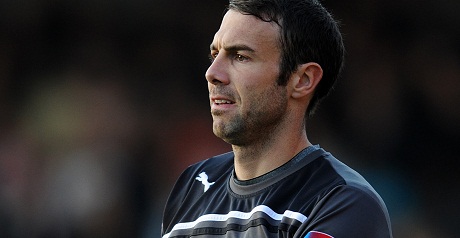Football psychology and how it’s helped me through tough times
Since my last blog I played in my first competitive match for over six months, keeping a clean sheet in our recent Johnstone’s Paint Trophy win over Crawley Town.
I’m delighted to be back involved having successfully recovered from my early-season injuries. And to have kept a clean sheet on my return is also very pleasing. I am fulfilling my promise; I’m testing Simon Moore for that starting place back!
The whole team is delighted to have progressed in the JPT, against a tough Crawley side too, and perhaps this year could provide the Wembley appearance I long for?
A few people have been asking me how I stayed positive through the injury setbacks and, more generally, how players cope when out injured, so I thought it would be a good idea to share my experience.
The psychology of football is something that is becoming more and more prominent these days, and something more people are starting to think about.
It is something that has interested me for a very long time and has been instrumental in my recovery not just this time, but every time I have been injured in the past.
For those that don’t know this about me, I have several qualifications in psychological studies, such as NLP certification training, and have read in excess of 100 books on the subject of psychology.
Something I have been working on through my last injuries is the idea of ‘controlling what is within your power’.
In short, it means not worrying about things you can’t necessarily affect, and focusing only on what you can do.
I kept reminding myself that the pain will go away – it is only temporary.
Even so, I must say it is still hard to stay positive at all times. It is only human to start doubting in your mind whether you will recover or not.
Everything is great in football when you’re fit and playing well. You’re the name on everyone’s lips and on a real high, even off the pitch.
But I’m sure any footballer will testify that, for all those highs, you will have twice as many lows. It is how you respond to those lows that shapes your career as a footballer.
At times of crisis of confidence, personal doubt or injury – especially recurring injuries – the kind of mental processes I’ve been able to put in place really do help.
Another excellent process is setting yourself achievable yet challenging objectives every day, allowing you to leave the training ground with a feeling of satisfaction and progression, rather than frustration. It is a simple yet powerful tool.
Football psychology is something the manager Uwe Rosler is interested in too.
For example, before the season, he asked us to have a look through books and pick out inspirational quotes that struck a chord with us personally.
It is obviously important for Uwe to have his players in a positive mindset before every game.
Ultimately though, most managers and players would agree that it is down to the player to do what it takes to make sure he is completely mentally ready to train and play matches.
In last month’s blog I gave a special mention to Brentford’s Head of Medical Neil Greig for his work with me, but I must also commend the club’s fantastic new physiotherapy facilities.
The finishing touches were made to the development of our training ground over the summer and, obviously, I was forced to spend a lot of time down there during my recovery, and I’ve been learning a lot about physiotherapy and the work our fantastic physios do.
If I compare how Brentford is now to how it was when I arrived two years ago, it’s like night and day.
After the investment and development, the club’s facilities are fantastic now. It feels like a Championship club – like it did when I was at Watford.
Everything is geared up to get to the Championship and we are all ready.
With the promise of a new stadium too there is a real buzz about the club and real sense of a bright future to come in the Championship.
Now it is up to us, the players, to take us there on the pitch!
Richard Lee is the author of Graduation: Life Lessons Of A Professional Footballer.
Follow West London Sport on Twitter
Find us on Facebook


The psychology of football on the Connecting Minds Network
20/10/2012 @ 9:07 am
[…] Read more here Posted by: CM NetworkIn: cm blog Stay connected:Menu […]